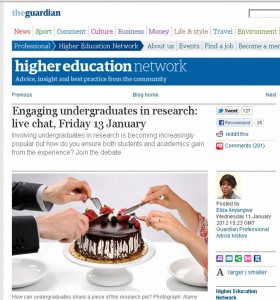BournemouthUniversity’s Associate Professor,Heather Hartwell, took part in a lively online debate on Friday, discussing how to engage undergraduates in research.
 Hosted by the Guardian Higher Education network, Dr Hartwell joined panellists from the Universities of Leeds,Central Lancashire,East LondonandLincolnamong others, to provide expertise and advice on how to develop undergraduate research programmes and ensure they are successful.
Hosted by the Guardian Higher Education network, Dr Hartwell joined panellists from the Universities of Leeds,Central Lancashire,East LondonandLincolnamong others, to provide expertise and advice on how to develop undergraduate research programmes and ensure they are successful.
Dr Hartwell explained BU’s ‘fusion’ concept, describing ‘a community where research is part of core business and where both undergraduates and post graduates are engaged in that activity so becomes part of the ‘daily’ business’.
The British Conference for Undergraduate Research was widely considered by panel members to be an excellent initiative. This takes place at theUniversityofWarwickin March, with ten BU students from theSchoolofTourismpresenting posters.
Fellow panellists and participants in the web chat were also impressed by  Dr Hartwell’s own experiences engaging undergraduates with research; notably her work with theUSarmy. “We were awarded a contract by theUSarmy to study food and emotions,” she said. “This was with the demographic of their ‘war fighters’, so young adults. During a first year lecture I asked for volunteers to help me, and the sea of hands was amazing. In fact recruiting students to help was beneficial because they were the same age group as the sample.”
Dr Hartwell’s own experiences engaging undergraduates with research; notably her work with theUSarmy. “We were awarded a contract by theUSarmy to study food and emotions,” she said. “This was with the demographic of their ‘war fighters’, so young adults. During a first year lecture I asked for volunteers to help me, and the sea of hands was amazing. In fact recruiting students to help was beneficial because they were the same age group as the sample.”
But it’s not only the students who benefit from engaging with research. Dr Hartwell commented that sometimes dissertation data is of such high quality that she has been known to use it to form the basis of a short co-authored paper.
Inevitably the issue of peer ‘snobbery’ was raised, questioning the status of published undergraduate research. Dr Hartwell suggested that if ‘published work was blind peer reviewed and therefore the ‘process’ did not know where the work had come from – it was accepted on its merit’.
The full debate can be viewed via the Guardian Higher Education Network.
 BU undergraduates showcase their research in South Wales, at the British Conference of Undergraduate Research 2019.
BU undergraduates showcase their research in South Wales, at the British Conference of Undergraduate Research 2019.










 Second NIHR MIHERC meeting in Bournemouth this week
Second NIHR MIHERC meeting in Bournemouth this week Dr. Ashraf cited on ‘Modest Fashion’ in The Guardian
Dr. Ashraf cited on ‘Modest Fashion’ in The Guardian NIHR-funded research launches website
NIHR-funded research launches website MSCA Postdoctoral Fellowships 2025 Call
MSCA Postdoctoral Fellowships 2025 Call ERC Advanced Grant 2025 Webinar
ERC Advanced Grant 2025 Webinar Horizon Europe Work Programme 2025 Published
Horizon Europe Work Programme 2025 Published Horizon Europe 2025 Work Programme pre-Published
Horizon Europe 2025 Work Programme pre-Published Update on UKRO services
Update on UKRO services European research project exploring use of ‘virtual twins’ to better manage metabolic associated fatty liver disease
European research project exploring use of ‘virtual twins’ to better manage metabolic associated fatty liver disease
I do agree with “a community where research is part of core business and where both undergraduates and post graduates are engaged in that activity so becomes part of the ‘daily’ business’”. everyone should take place for this kinds of program everywhere.
Learning about research methods is about gaining both knowledge and skills. It is great to hear Heather Hartwell promoting the involvement of undergraduate students in research. Nearly twenty years ago I wrote a short article with a fellow sociologist at the University of Aberdeen for a British Sociological Associations’ sponsored teaching handbook (Bonney & van Teijlingen 1993). In this contribution we outlined how we taught research methods to undergraduate students using research surveys we were involved with at the time. We also argued that learning research methods was best done under real-life conditions.
I would also agree with Heather that good undergraduate work can also lead to publications, especially if students have been allowed to get their ‘hand dirty’ in real research project. I have had some interesting peer-reviewed papers with undergraduate students over the past two decades. Interestingly, some of the students went on to do postgraduate degrees and published many more research papers. For others who went into different professions it remained the only academic paper they have ever published.
Finally, a more general point, namely that I am convinced that being actively involved in research makes you a better teacher, and that being involved in teaching research methods makes you a better researcher. The former widely accepted across most UK universities, but the latter deserves some attention too. Many experienced researchers will have stories to tell about bringing their research into the undergraduate classroom and then facing challenging questions from these students. Undergraduate students perhaps raise fresh ideas, or come with ‘innocent’ questions or approach the research questions without preconceived ideas about how and why research is conducted.
Prof. Edwin van Teijlingen
School of Health & Social Care, Bournemouth University
1. Bonney, N. & Teijlingen van, E. (1993) Research training in a ‘real-life’ survey, In: Middleton, C. et al. (eds.) Sociology Teaching Handbook: Practical Activities for